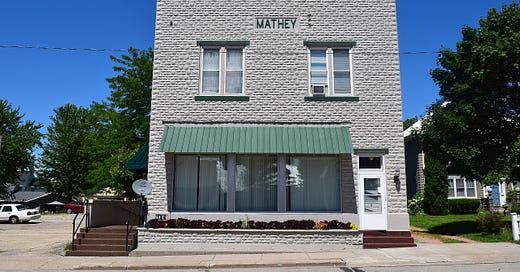If you did not have a chance to join my Live on LinkedIn today about why mental rest is so important for Future Readiness, you can still watch it on my LinkedIn profile.
Also, as you’re doing your final shopping and planning for your own growth, check out the books and prints at http://www.wiseeconomy.com/booksandgoodstuff. The books represent some of the absolute best reads — and there will be at least a few that will change your life, even though you probably had never heard of them before.
And at the bottom of that page you’ll find a link to an artist who does one-of-a-kind pictures of cities that will make your favorite urban geek’s day!
Especially at this moment in time, everything that we see and hear seems to be dominated by Big Stuff - national elections, federal policy, global climate change, international relations. And because much of what we hear or read is designed to keep us listening and reading, it’s easy to focus on that big picture…and on the fact that most of us have very limited power to affect it. The way most of us were taught history plays right into that: we were fed a steady stream of Big Events and Great Men (almost all men) as the creators of those Big Events. The rest of us, we gathered, were just supposed to ride along in their wake.
I had the great good fortune to become an accidental public historian in my 20s. For more than five years, I had the distinction of adding to the National Register of Historic Places the ugliest buildings in the State of Wisconsin. Most of my clients’ buildings weren’t the grand mansions and the graceful Beaux Arts public buildings. My clients had nondescript commercial buildings, abandoned mining sites, barns, sheds over wells and more than one building that looked like it might have been built in the dark.
When you nominate a place to the National Register, you have to argue for its significance according to one of a small number of criteria. My nominations almonst always fell under the Historic Significance criterion, which included both Great Men type buildings and structures that demonstrated something about the minimally-documented history of a community. So I nominated a whip factory. A mine headframe. A jail. A four-room schoolhouse. A handful of rail depots. The remnant buildings of a brewery.
All of these buildings’ significance depended on the stories they told, and none of those stories were about Great Men. They were about normal, sometimes anonymous people who did normal things that shaped the places they cared about, and were still shaping them 75 or 100 or 150 years later.
They were the ones who moved a place forward, who made the impact. Not just the local equivalent of the Great Men.
A lot of us have been feeling frustrated and ineffective over the past month+, as policies pass that hurt people we care about, and legal decisions don’t go the way we wanted them to, and people get put in charge who we don’t think should have responsibility for anything. And we can protest and fight and argue and lobby, but at the end of the day our ability to turn the massive ocean liner we find ourselves on is pretty limited.
The Big Stuff matters, but so does the little stuff. The things we can build in the places we care about.
Sometimes when I researched those nominations, I learned that an otherwise nondescript place was a local eddy in a national tide of change. Sometimes I learned that the place was part of developing something important, like how to build better silos for storing cattle feed, which led to the year-round commercial supply of milk that most of us take for granted. And sometimes I learned that the place was just a local place, one that mattered to the people who lived in it or passed it, and nothing much more than that.
But in all of those places, they mattered. Mattered enough that state and national agencies decided to give them a special designation.
National news aside, we’re in a time of year when those of you who are working on making the places you care about better…. are probably really burned out. We have too many end-of-year deadlines, too many grants that require too many stupid attachments, too many people who just want One More Thing, and all of that on top of the parties and the special events and the ho-ho-hoing that we’re also supposed to do. It’s a burnout tornado.
The Live I did on Thursday was about rest as a Future-Ready skill. And a necessity, especially for our brains, which we demand so much of anymore. And even when we feel guilty about the burnout, because we imbibed this Industrial Era idea that we should just run like machines, we still burn out. So if you’re just trying to drag yourself through to the end of next week or the 24th or whenever you anticipate finally getting a break, I get it.
But I think it’s worth remembering that what you do for your community matters. It matters a whole lot, in ways that you won’t always know right now. What you do might eventually help move a nation, or it might just fill a gap where you are.
And 75 or 100 or 150 years from now, perhaps someone will be looking at your work and showing others just how impactful it really was.


